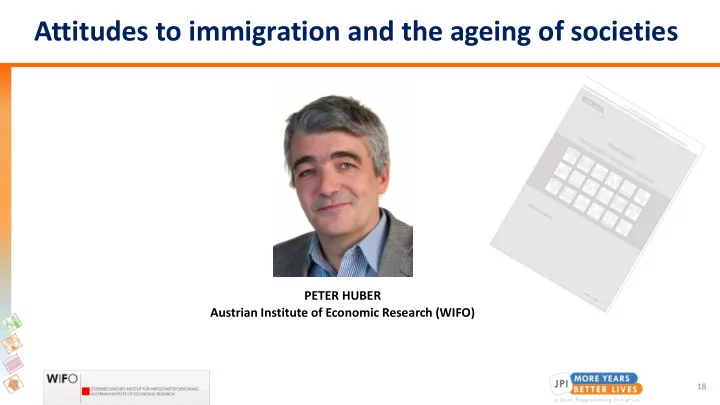

Attitudes to immigration and the ageing of societies PETER HUBER Austrian Institute of Economic Research (WIFO) 18
Attitudes to immigration and the ageing of societies Fanny Dellinger, Michael Haan, Peter Huber, Natalie Iciaszczyk Conference Brussels, 13.2.2018 Increasing the Knowledge Base on Demographic Change
Motivation • Old-age dependency ratios in European economies will halve until 2050 (United Nations 2015). • This may have severe economic implications on social security systems, productivity, innovation, growth, labour market flexibility, structural change …. • To reduce the potential adverse effects of an ageing society, often increased immigration is called for. • The effectiveness of such a strategy, however, is contingent on several pre-conditions: 1. Demografic Pre-conditions: immigrant groups have sufficiently higher and stable fertility rates than natives or immigration continues in the long run 2. Economic Pre-conditions: Immigrants should be net contributors to the welfare state, economically well-integrated should possess skills that are in demand and appropriately used in the receiving countries. 3. Political Pre-conditions: Democratically elected Governments need to be able maintain immigration-friendly policies, avoid increased inter-ethnic tensions.
Content and caveats Present results of a literature review with respect to three questions: 1. Is there a reason to believe that the ageing of societies could lead to increased anti- immigration sentiments among the native population 2. What are the determinants of attitudes to immigration among the native population in general? 3. Are there gaps in this research? Caveats 1. Results are our reading of the literature 2. Literature uses very different definitions of the terms „migrant“ and „attitudes to migration“ 3. Identification assumptions for effects are often unclear and many estimates are likely to suffer from missing variable and reverse causality bias
Ageing and attitudes to immigration • Almost all of the studies reviewed find that older people are more strongly opposed to migration • This is, however, only imperfect evidence of impact of people turning more „anti - migration“ as they get older • An alternative explanation would be a cohort effect. This introduces a fundamental identification problem • We found only three studies that attempt to seperate ageing and cohort effects • Calahorrano (2011) uses individual level data from the German Socio-Economic Panel (GSOEP) between 1999 and 2008 to find evidence that is highly supportive of a distinct ageing effect. • Schotte and Winkler (2016) use repeated cross-sectional data from the ESS for the period 2002 to 2012 to find that that cohort effects are more important than ageing effects, • Hermann (2015) focuses on descriptive evidence from voter analyses following referenda to show important differences in ageing effects across cohorts.
Determinants of attitudes to immigration • A much larger literature from a variety of disciplines and using a various of methods focuses on the determinants of attitudes to migration • We structure this around four questions that have influenced many of the contributions 1. To what degree is opposition to migration linked to self-interest or concerns about society as a whole 2. Are economic or cultural concerns more relevant? 3. To what degree are concerns related to migration rational? 4. Does exposure help to reduce anti-immigrant sentiments? • Results • Self-interest seems to play a role, but concerns over cultural and economic development of a society are much more relevant • Cultural concerns are more important than economic ones (two to five times as important according to Card et al . 2012) • Concerns often lack rationality and are heavily influenced by news and media as well as the framing of debates • Exposure does reduce prejudices. However, experimental evidence provides clear evidence only in cases of long term exposure
Open questions • Related to ageing • Do people get less welcoming as they age? • Does demography have an impact on attitudes to migration? • The impact of pension systems. • More generally • What is link to integration policy and national institutions? • Impacts from housing market competition? • What do results imply for policies? • Methodologically • Develop Data! • Examine impact of different measurement concepts on results. • Increasingly use experimental or quasi-experimental approaches where identification assumptions are clear.
Thank you for your attention! Peter Huber Austrian Institute of Economic Research e-mail: huber@wifo.ac.at
Recommend
More recommend